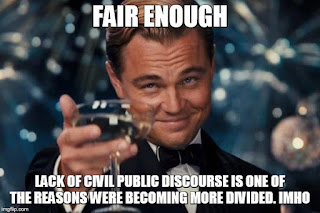Postman, Ch. 2 ((Media as Epistemology)
In the second chapter of, "Amusing Ourselves to Death: Public Discourse in the Age of Show Business," by Neil Postman, he focuses on the concept of Epistemology and how it is affected in media. Many people, including myself, may have not heard of the word "epistemology" before and are wondering what it means. The way that Postman describes it is a complex and usually opaque subject concerned with the origins and nature of knowledge. (Postman, 17) If this definition is too complicated, I will try to break it down in simpler terms. It is simply the philosophy of knowledge and it seeks to answer certain questions about knowledge: what it is exactly and how does one acquire it?
Within this chapter, Postman tries to explain why it is necessary to drive hard the point that the weight assigned to any form of truth-telling is a function of the influence of media of communication. One quote that really stuck with me personally within this chapter was, "Truth, like time itself, is a product of a conversation man has with himself about and through the techniques of communication he has invented. (Postman, 24)
Postman has three main points that he believes serves as a defense against counter-arguments that the readers may have formed. (Postman, 27-28) The first being that changes in media bring changes in the structure of people's minds. We can use this point and apply it to a specific example that is effecting us currently. Ask yourselves: how would the 2021 election have gone if we didn't have media? What would have changed? Would anything stay the same? We ask these questions to see how big of an impact media has on epistemology or knowledge itself.
The second point is how old media can disappear, and with that, we can see the institutions and cognitive habits they favored and other forms of conversation will remain. What he means by that is how different forms of information are spread and how it can have an affect on epistemology. To give specific examples to give you a more visual idea; before television, we got news from newspapers or even word of mouth. It is quite clear that in this generation, majority of teenagers and young adults no longer read the newspaper and often get news from social media or tv news stations. We can ask ourselves, where do we think we will get our information and media in the future? And, will it have a big affect on epistemology?
The third and last point Postman gives is that a television-based epistemology pollutes public communication and its surroundings (not that it pollutes everything). What Postman may mean by this is how we currently have biased television networks. Some are more conservative while some may be more liberal. Based off the information they give you, can really affect one's mindset on certain topics in public discourse.


It is good to see that even people who weren't familiar with the meaning of epistemology before reading don't just get totally lost in this chapter.
ReplyDeleteThere is something I feel I must address though, "how would the [2020] election have gone if we didn't have media?". . . Like, "none" none? No media at all? M8, no one would have any idea who to vote for. The only way to be an informed voter in a place with NO media is to follow each candidate around until you get an idea of what their about. Otherwise you're gonna base your entire vote off of that one time a candidate(s) came around to give a speech. In that case, you also just have to pray they told the truth. The only way to verify such information would be the aforementioned following of that person.
So, it would really come down to which candidate could make the best impression on the most people. Which is kind of how it already is. What I'm trying to say is that having all this media (social and otherwise) is really just having no media with extra steps.